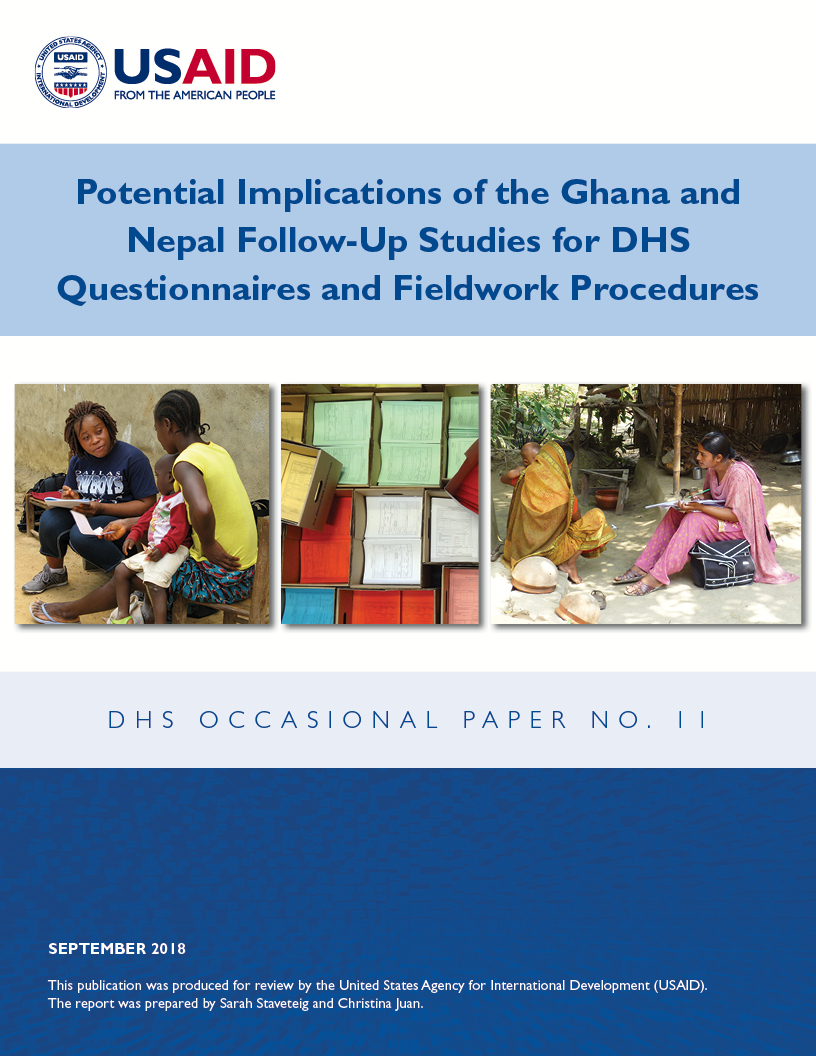
Abstract:
Recent follow-up mixed-methods studies undertaken by The Demographic and Health Surveys (DHS) Program in Ghana and Nepal sought to better understand the reasons behind unmet need and barriers to contraceptive use. Both studies, the first of their kind at The DHS Program, re-interviewed a selected number of respondents from a parent DHS survey: the 2014 Ghana DHS and the 2016 Nepal DHS, respectively. As such, in addition to their substantive findings, these follow-up studies also provide unique insights into measurement issues, themes not well captured by existing questionnaires, and reflections on the DHS survey process that could potentially benefit future DHS questionnaires and fieldwork procedures.
The purpose of the project on which this report is based was threefold: first, to share the Ghana and Nepal studies with a technical review panel of DHS survey management and questionnaire experts, who may find ways to translate the studies into revisions of DHS questionnaires or fieldwork procedures; second, for the report authors to propose specific changes to DHS questionnaires and fieldwork procedures for the panel to review after reading both reports; and third, after meeting with the panel, to revise proposals, circulate a draft report to panel members for additional feedback, revise again, and then make our recommendations public.
This report contains eight proposals, four that earned support for possible inclusion in the DHS Woman’s Questionnaire, and four that garnered varying levels of support for testing or inclusion in specific country contexts where the issue is relevant. The four potential additions to the core questionnaire are: ways to improve the accuracy of current family planning method reporting; questions about receipt of family planning counseling around the time of the most recent birth; questions to gauge proximal fertility intention concordance with partner—which sets the stage for potential fertility empowerment questions; and flags to indicate field estimation of ages and dates. The four proposals for inclusion in specific country contexts where the issue is relevant are: follow-up questions on fear of side effects and health concerns, questions about postabortion family planning counseling and use, questions to capture prolonged and postpartum abstinence as a method to regulate fertility risk, and questions about contraceptive preparedness during extended periods of marital abstinence. For each proposal, we provide a brief description of the issue it addresses, the proposal itself, panel discussion and feedback, advantages and disadvantages, and recommended next steps with policy and programmatic implications.
 Potential Implications of the Ghana and Nepal Follow-Up Studies for DHS Questionnaires and Fieldwork Procedures (PDF, 1200K)
Potential Implications of the Ghana and Nepal Follow-Up Studies for DHS Questionnaires and Fieldwork Procedures (PDF, 1200K)
